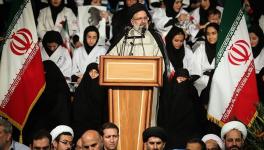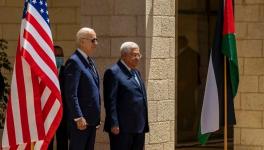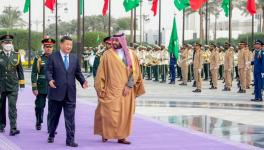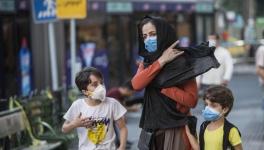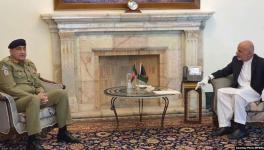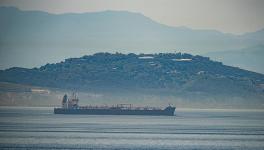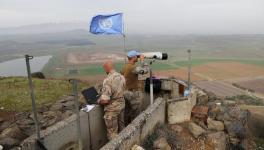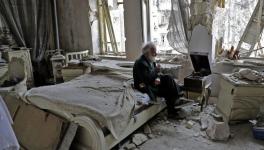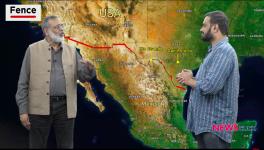Russia and China Stops UN Security Council Resolution
Syria continues to be in the public eye with a bomb blast that killed three senior public functionaries (now four) and the west-backed UK resolution vetoed by Russia and China. The one-sided UK resolution called for the withdrawal of Syrian Government forces from population centres but said nothing about armed opposition groups. It was also under Chapter 7 of the UN Charter that allows sanctions and if necessary, military action by the UN and its member states. The military intervention in Libya was under a similar Chapter 7 resolution. It started with a no-fly zone but was rapidly extended to military intervention by NATO for a regime change in Libya. Clearly, this is the road that the US and its allies want to take in Syria too.
While South Africa and Pakistan abstained on the west-backed UK resolution, India voted along with the US and its allies. India's Representative to the UN, Hardeep Puri, tried to explain India's vote, but his statement did not address the key issue – that the UK resolution was completely one-sided, asking Syrian security forces to withdraw from population centres within 10 days while leaving the armed opposition groups in place. He talked about the need to continue the UN observer mission and therefore India's vote but this was not the contentious issue. The operative parts of the UK resolution that lead to the Russian and Chinese veto, as well as the South African and Pakistani abstention, had to do with the attempt to disarm the Syrian state in the current near civil war conditions. Further, the way a similar Chapter 7 resolution was used in Libya, it also could have become an enabling measure for unilateral sanctions and possible military action by NATO forces. The UN Security Council later on agreed unanimously to extend by 30 days the UN Observer Mission, though initially Russia had wanted an unconditional extension. The 30 days extension put the Syrian issue back on the Security Council agenda within the next 30 days.
In the UN resolution on Libya, 5 countries -- Russia, China, India, Brazil and Germany – had abstained. This time, India has clearly broken ranks with the other BRICS countries and sided with the US.
It is clear that the US and its allies do not want a peaceful resolution to the Syrian conflict. Otherwise, what Kofi Annan had proposed to Bashar al Assad during his discussions in Damascus – a locality by locality ceasefire to be negotiated between the different armed groups and the Syrian state by the UN Observers -- should have been the way forward. Particularly, as there is no obvious other side in Syria – the rebels are splintered and quarrelling amongst themselves. What Annan proposed to the Security Council remains shrouded in mystery. The UK resolution of allowing military intervention with only one side – the Syrian government forces – withdrawing from population centres is as good as asking Bashar al Assad regime to give up governing the towns. Obviously, the US and its allies knew that Russia and China would oppose it and therefore this resolution that would never get through the Security Council. What the aborted resolution did was to fix a maximalist position, which would then become the demand of the rebel forces in Syria. It was meant to stoke the fires of civil war in Syria, with arms, money and fighters being imported through neighbouring countries. Even major US newspapers -- New York Times, Washington Post -- have reported that CIA is coordinating the distribution of arms to the rebels from a location within Turkey.
It is not a surprise that the bombing that killed the Defence Minister and other senior leaders of the Syrian Government have not been condemned by the western powers. Obviously, terrorist attacks are all right, if they target regimes that the west would like to be changed. They are heinous when they target regimes that are in alliance with the US and its allies.
The larger “war” is of course against Iran. Syria is being targeted in order to weaken Iran and isolate Hezbollah in Lebanon. Russia's U.N. Ambassador Vitaly Churkin stated to Matthew Russell Lee of Inter City Press ,
“It's all about Iran..". He said that after the US invasion of Iraq, it worked out differently than the US had expected -- with an expanded Shi'a and Iranian role, that is -- now they had to try to contain Iran, by way of Syria.
The propaganda war on Syria makes it difficult to know what is really happening there. Periodic reports of Assad regime troops carrying out massacres appear manufactured once more information trickles out. The recent Tremseh massacre, which hit international headlines, turns out to be a fire fight between rebels and Syrian security forces and not a massacre of civilian as originally reported. But there is little doubt that the Syrian regime is under siege, with defections from senior levels taking place and the fight now reaching Damascus. The armed forces seem to be still united behind Assad; the support of Damascus and Aleppo, the two towns where 60% of Syrian population live, has also not shifted.
The people of Syria do not want a repeat of either Iraq or Lebanon. Clearly, there are powerful forces that do not care if this is a fate that befalls Syria, as long as they can take Assad out. The game is regime change, devil take the consequences -- for either the Syrian people or the region.
Get the latest reports & analysis with people's perspective on Protests, movements & deep analytical videos, discussions of the current affairs in your Telegram app. Subscribe to NewsClick's Telegram channel & get Real-Time updates on stories, as they get published on our website.










